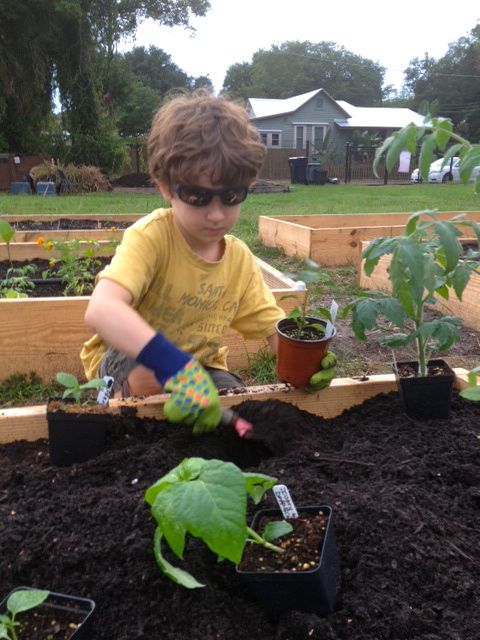Over the course of the last year, my family has taken a big step towards becoming good stewards of the Earth by “going green” and building neighborhood ties through participation in our community garden.
Community gardens provide important and valuable benefits for children. This type of gardening makes it easy for your kids to become interconnected nature lovers. But there’s an added benefit: working together with others for a greater good fosters a strong sense of responsibility and enlightenment vital to becoming a productive global citizen.
Before scoring the last available plot at our local community garden, we were gardening newbies, and so excited for the opportunity to participate in such a wonderful educational and cooperative experience.
As a family, we’ve learned so much already and look forward to gaining and sharing even more gardening wisdom with our fellow members consisting of both new gardeners like ourselves, as well as more skillful, accomplished growers.
Gardening is a very interactive and engaging activity for kids. They seem naturally drawn to the experience and want to jump right in. There are so many hands-on opportunities to learn about the environment and conservation, including: the importance of healthy soil; how the water cycle works; saving our planet’s resources by recycling and reducing waste. Kids can also begin to develop an in-depth understanding of where their food, clothes and medicines come from. These are great lessons that help children develop a strong appreciation for nature, as well as an understanding of the interconnectivity of our world.
Here are four wonderful ways that community gardening can help connect kids with nature, and inspire them to become good global citizens:
1. Ahh… It’s Serene and Peaceful.
In a world where conflict and hostility seem to surround us, community gardens create a space where kids can relax and feel a sense of peace, joy and cooperation. Community gardening is one of those things that seems to bring out the best in people. It joins people in a common purpose and is universal in that it bridges social, cultural and economic boundaries.
Participants peacefully work together as co-stewards of a plot of earth with the unselfish goal of making the most productive, sustainable use of it.
2. Fosters a Sense of Confidence (Even in Young Children)
The boys delight in fulfilling their responsibilities at the garden. From shoveling soil into the frame of our plot, to designing the layout of seeds and sprouts.
They are always happy to make necessary trips to the garden to fulfill their duties such as depositing our household compost contributions, and helping to tidy up the plot by raking and weeding. The boys recently harvested sweet potatoes from the community plot!
3. It’s So Messy & Fun!
Kids love getting messy and there’s no shortage of dirt to be shoveled and moved. Even better — there’s compost to make! Composting begins at home with things like yard clippings, vegetable scraps and egg shells. We collect ours in a container on our back patio and take it to the garden compost pile every week. When mixed with soil, the bacteria, fungi, worms and insects break it down to create nutrient-rich soil perfect for growing new fruits and veggies!
4. It Fosters a Sense of Community That Lasts a Lifetime
Many community gardens, like ours, are located in rundown sections of a city where members pull together to take care of a small patch of green space in an effort to begin to heal the wounded neighborhood with respect, cooperation and generosity. Community gardens can provide a wonderful, real-world example of the importance of community cooperation, environmental stewardship and sustainability. It’s so important for kids to witness adults modeling these types of productive community interactions. The garden provides many great examples of collaboration and teamwork to be observed by little global citizens and future peacemakers!
Given all the great benefits community gardens provide, it is so nice to see that they are sprouting up in urban areas around the world!
Click for *free* K-12 educational resources provided by Green Education Foundation (GEF). GEF is a national non-profit organization committed to creating a sustainable future through education “to inspire K-12 students and teachers to think holistically about global sustainability concerns and solutions.”
Help your global kids benefit from the community gardening movement! Click here to find a community garden near you! Click here to learn how to start a community garden!
Happy gardening!





































Very informative and useful tips.